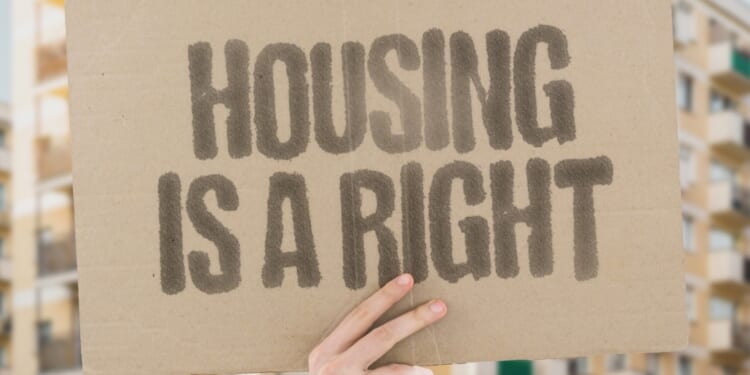On Monday, a young woman from New Hampshire was featured prominently in a front-page Wall Street Journal story.
She didn’t found a company or create a valuable new product. Quite the opposite; she spent the summer canvassing for the Democratic Socialists of America in New York City, where she hopes to get socialist Zohran Mamdani elected mayor.
The story in which she is featured (and pictured) as the face of young American socialists, wearing a “Freeze the rent” t-shirt, was titled “The rise of America’s young socialists.”
How did a middle-class child of New Hampshire wind up embracing socialism in New York City?
The simplistic answer is that the idealistic Genevieve Rand was seduced by native New Yorker Bernie Sanders’ comic book socialism.
“She didn’t consider herself particularly political until she encountered Sanders, then in the midst of his outsider campaign for the Democratic Party’s 2016 nomination,” the Journal reported. Mamdani, too, credits Sanders with drawing him to socialism.
But this answer is insufficient.
Rand told the Journal that the 2008 financial crisis wrecked her family’s finances, and she struggled as a young adult to afford food and housing. She joined a tenant’s rights movement in Ithaca, N.Y., then the Democratic Socialists of America in New York City.
Everyone who cares about preventing the expansion of socialism in America should pay attention to the Journal’s description of Rand’s conversion.
Rand explained, her membership in the group was less ideological than practical. New York politics, she argued, are dominated by real-estate barons. The only way to level the field was by mobilizing the grassroots. The DSA had proved itself adept at doing so and focused on the issues that most concerned her.
“Why should I care about saving democracy if it can’t provide me a home to live in or food I can afford?” she asked, calling housing “the economic issue of our time.”
Rand’s radicalism is fueled by real grievance, namely the astronomical cost of housing. But the causes of those grievances are not what she was told.
New York City rents aren’t high because of greedy real estate barons. They are high, as reams of studies have shown, because the city imposed excessive restrictions on residential construction and piled on top of those restrictions additional disincentives, particularly rent control.
Bernie Sanders is the most seductive slinger of simplistic socialist slogans in America. But his rhetoric alone can’t generate the recent Gallup poll finding that only 54% of Americans now have a favorable view of capitalism, while more than 1/3 (39%) view socialism favorably.
Among adults ages 18-34, 49% view socialism positively, while only 43% view capitalism favorably. Fully two thirds (66%) of Democrats today view socialism favorably, while only 42% view capitalism favorably.
This doesn’t happen just because of rhetoric. There have to be underlying problems that socialism’s easy answers promise to fix.
In August, we wrote about research showing that government restrictions on housing construction are causing areas with high housing restrictions to become more left-leaning. Some of this is driven by shifts in the political leanings of higher-income Americans. And some is driven by the frustrations of younger Americans who are priced out of housing markets. Left-wing policies like rent control and government housing become more popular when government restrictions cause housing shortages.
Had New Hampshire municipalities not spent decades suppressing the construction of entry-level housing by making it extremely expensive—or even illegal— to build, maybe Genevieve Rand’s story would’ve turned out differently. It’s hard to sell socialism when everybody’s comfortable and prosperous.
Socialism sells when people feel that capitalism isn’t working for them. It’s easy to feel that way when every house and apartment in your community is too expensive to even dream of affording. That situation doesn’t happen if builders are allowed to build homes and apartments.
As we pointed out in August, and the Wall Street Journal confirmed again this week, there’s a strong connection between the government-caused housing shortage and young Americans’ embrace of socialism, or what they think is socialism, anyway.
Similar trends are happening in health care, child care and higher education. These issues all share the common trait of being heavily regulated by the state, with excessive barriers to entry, mounds of bureaucracy, and layers upon layers of unnecessarily added costs.
In less regulated industries, capitalism is working fine. Bernie bros aren’t going door to door demanding a government takeover of LG for making really affordable televisions or Spotify and other streaming services for reducing the cost of recorded music. Prices for televisions are 99.38% lower in 2025 than they were in 1950. That’s capitalism at work.
Housing, health care, child care and higher education are all industries heavily regulated and/or subsidized by government, where a functioning free market does not exist. These are the areas where dysfunctional markets and rising prices are turning desperate young people toward self-described socialists selling easy fixes. People too young to have experienced the 1970s or remember the Soviet Union are easy marks for charismatic charmers selling socialist snake oil.
For people to believe in capitalism, it has to work. It can’t work when government interventions become so thick that they significantly suppress investment, exchange and innovation.











